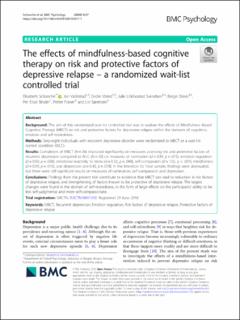| dc.contributor.author | Schanche, Elisabeth | |
| dc.contributor.author | Vøllestad, Jon | |
| dc.contributor.author | Visted, Endre | |
| dc.contributor.author | Svendsen, Julie Lillebostad | |
| dc.contributor.author | Osnes, Berge | |
| dc.contributor.author | Binder, Per-Einar | |
| dc.contributor.author | Franer, Petter | |
| dc.contributor.author | Sørensen, Lin | |
| dc.date.accessioned | 2021-08-03T10:38:43Z | |
| dc.date.available | 2021-08-03T10:38:43Z | |
| dc.date.created | 2021-02-24T14:59:36Z | |
| dc.date.issued | 2020 | |
| dc.identifier.issn | 2050-7283 | |
| dc.identifier.uri | https://hdl.handle.net/11250/2766001 | |
| dc.description.abstract | Background
The aim of this randomized wait-list controlled trial was to explore the effects of Mindfulness–Based Cognitive Therapy (MBCT) on risk and protective factors for depressive relapse within the domains of cognition, emotion and self-relatedness.
Methods
Sixty-eight individuals with recurrent depressive disorder were randomized to MBCT or a wait-list control condition (WLC).
Results
Completers of MBCT (N = 26) improved significantly on measures assessing risk and protective factors of recurrent depression compared to WLC (N = 30) on measures of rumination (d = 0.59, p = .015), emotion regulation (d = 0.50, p = .028), emotional reactivity to stress (d = 0.32, p = .048), self-compassion (d = 1.02, p < .001), mindfulness (d = 0.59, p = .010), and depression (d = 0.40, p = .018). In the Intention To Treat sample, findings were attenuated, but there were still significant results on measures of rumination, self-compassion and depression.
Conclusions
Findings from the present trial contribute to evidence that MBCT can lead to reduction in risk factors of depressive relapse, and strengthening of factors known to be protective of depressive relapse. The largest changes were found in the domain of self-relatedness, in the form of large effects on the participants’ ability to be less self-judgmental and more self-compassionate. | en_US |
| dc.language.iso | eng | en_US |
| dc.publisher | BMC | en_US |
| dc.rights | Navngivelse 4.0 Internasjonal | * |
| dc.rights.uri | http://creativecommons.org/licenses/by/4.0/deed.no | * |
| dc.title | The effects of mindfulness-based cognitive therapy on risk and protective factors of depressive relapse – a randomized wait-list controlled trial | en_US |
| dc.type | Journal article | en_US |
| dc.type | Peer reviewed | en_US |
| dc.description.version | publishedVersion | en_US |
| dc.rights.holder | Copyright 2020 The Authors | en_US |
| dc.source.articlenumber | 57 | en_US |
| cristin.ispublished | true | |
| cristin.fulltext | original | |
| cristin.qualitycode | 1 | |
| dc.identifier.doi | 10.1186/s40359-020-00417-1 | |
| dc.identifier.cristin | 1893277 | |
| dc.source.journal | BMC Psychology | en_US |
| dc.identifier.citation | BMC Psychology. 2020, 8, 57 | en_US |
| dc.source.volume | 8 | en_US |

